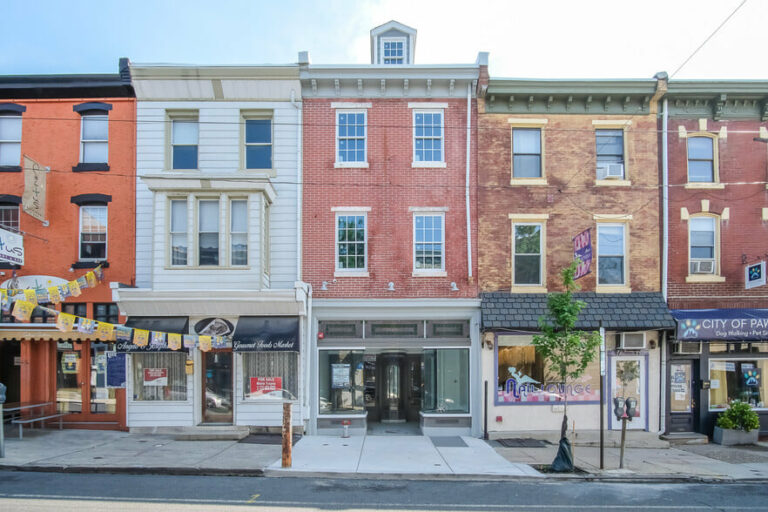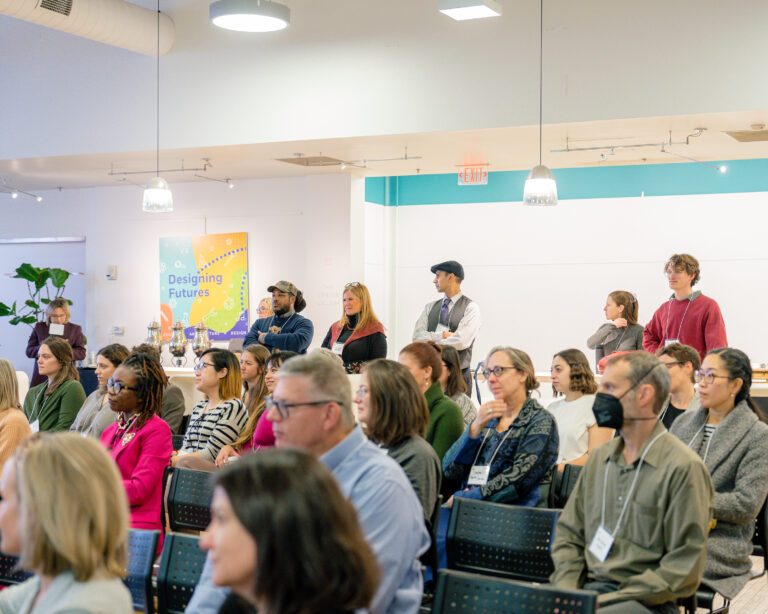City of Philadelphia’s Commerce Director Harold Epps Meets with SBN’s Community of Local Independent Businesses
By definition, the City of Philadelphia’s Commerce Director is charged with providing resources to local businesses. However, with thirty years of experience in the corporate world, Harold Epps has taken the initiative to ensure the scope of his impact is far more expansive. From Center’s City’s high rises to vacant lots in north Philadelphia, Epps is involved in it all, seeing not only where we are but where we are going. He is looking to what the future holds as he promotes growth throughout all of the city’s diverse neighborhoods. He was able to share some details on his team’s work at October’s Entrepreneur’s Roundtable, an event exclusive to Sustainable Business Network of Greater Philadelphia (SBN) members that allows local business leaders to engage in conversation with local policy makers.
“The reason I took the job was because I wanted to help facilitate as much progress in the neighborhoods as possible,” said Epps.
Our city is, without a doubt, growing. And while much of the focus has historically been on developing Center City, Epps is making it a priority to diversify funding to all of Philadelphia’s neighborhoods. Providing safe, clean, and well-lit areas to support this development lays the building blocks for new business growth and residential expansion throughout our diverse areas. With a population comprised of nearly 44% African American, 16% Hispanic and Latino, and 5% Asian, Epps realizes the importance of prioritizing minority and women business development in order for the economy to prosper. “We need to ensure that our workforce looks as much like the city as possible,” urged Epps.
As he implements diversity and inclusion policies, Epps has encountered a variety of unique challenges. With nearly 25.5% of Philadelphia living in poverty, the city faces a pressing problem. Providing housing is obviously crucial, but providing economic opportunities that allows citizens to be upwardly mobile is also an urgent need. As Epps has discovered, there is no blueprint for identifying which funding focus will have the most positive impact.
One investment that does carry with it an almost guaranteed positive impact is education. On a recent trip to Denver, the Commerce Director witnessed how other cities are stressing the importance of growing an educated workforce. In Denver, 55% of the population has attained 2 or 4-year degrees. This has opened the doors to business growth and the unemployment rate now stands at only 2%. In comparison, in Philadelphia only 35% of the population has attained a 2 or 4 year degree and the city faces an unemployment rate of 6%. This disparity illustrates to Epps the immense need for our city to begin investing in education, saying,
“Philadelphia is going in the right direction, but not nearly as fast enough.”
The current reality is that our public schools are in desperate need of an upgrade. Many areas are not yielding quality talent ready for the workforce and it is becoming evident that supplemental programs are necessary. Responding to these needs, the Commerce Department is now moving to collaborate with respective parties to introduce supportive resources such as coop, intern, and network experiences to show students the possibilities available after graduation and the importance of higher learning. “One of the biggest frustrations is taking our legacy manufacturing ecosystem and transferring it to a knowledge economy,” said Epps, “because that’s where the jobs go today.”
As our government works to secure more funding to encourage success in our public schools, another need is evident. Nontraditional students, a large population between the ages of 18–35, need to return to education to be able to gain employment. Without sufficient education to land them quality employment, many are left with fewer employment opportunities. And unfortunately, the lack of access to gainful employment can lead to an increase in drug activity in disadvantaged neighborhoods. This contributes to the sobering reality that more than a third of minority men in our community will come in contact with the judicial system, which not only stigmatizes them, but also limits their access to quality employment for the rest of their lives among other rights
Epps recounted a personal experience. Sitting behind a group of young people on the subway, the Commerce Director could hear a young man and two friends complaining how they are struggling to find jobs, so Epps decided to reach out. Offering his business card, he encouraged them to contact him for help. After one of the young men contacted him, Epps took on the project of helping him in his job search and was able to see first-hand the struggles that face many under-served youths as they try to provide for themselves and convince employers to give them a chance. By seeing how this young man’s story represents a larger narrative it is clear why so many fall back into poverty and unemployment despite their efforts. “As a community, we need to reach out and lift up our neighbors to give them access to equal opportunities,” said Epps.
An additional challenge in our educational system lies with students who do make it to college but are still unable to find gainful employment. As more students choose to attend colleges and universities, the need for technically skilled workers continues to rise throughout the city. In addition to not being able to find available jobs post-graduation, most students then carry nearly insurmountable college debt in addition. Epps urges both students and universities to put more emphasis on technical careers, as well as in the fastest growing segment in the city, the medical field. As one of the industries less vulnerable to outsourcing its labor force, it is vital that we realize this opportunity and begin preparing a work force to meet the needs of this rapidly growing industry.
While education is certainly a huge challenge facing our community, we are also facing a lag in our number of startup businesses. To address this, the Commerce Director is dedicating staff to specifically focus on helping these businesses, making governmental aid more accessible, and promoting the tech and startup ecosystem. Curtis Gregory, Senior Director at the Office of Business Services, shares Epps extensive business background, and together the two are focused on results and accountability for their new initiatives.
Recognizing that capital procurement is a huge issue for new businesses, the team has created an online platform for which businesses may submit their information once and then disperse it to a multitude of banks and financial providers to petition for capital investment and loans. Once a lengthy and stressful process for new business owners, this implementation has made the first steps towards making funding more more fluid and accessible for small businesses and startups. In addition, the city is taking steps to encourage business development including investing in neighborhood beautification, providing grants to aid in high startup equipment costs, and enacting a Business Bill of Rights to ensure accessibility and accountability between business and local government. SBN has been instrumental in communicating the needs of the local, independent business community for the latter.
While we as citizens of Philadelphia are clearly invested in these new implementations for education and business, other stakeholders are also taking notice. Namely, Amazon. Epps communicated that although our geographic location offers needed efficient and affordable centralized access to other nearby metropolitan areas such as Washington D.C. and New York City, we have much more to offer the global company such as talent, affordability, and available infrastructure capacity.
Not only do the nearly 100 surrounding universities provide thousands of skilled graduates every year, but the Commerce Director is assured that the affordability of the city also lends itself to incoming talent relocating for employment at Amazon. Because sticker shock of the high cost of living in nearby areas, such as New York City, will likely make it more difficult and expensive for Amazon to recruit should they go elsewhere, Philadelphia poses a promising alternative. In terms of capacity for growth, Philadelphia also poses a viable option. Once home to nearly 2 million people throughout the 1950’s, today our population has dipped to just 1.5 million, which means we have available capacity for the influx of workers Amazon will no doubt introduce.
Although there are detractors and people concerned with the unintended consequences of courting such a large company, this potential for a rapid influx of available jobs has many in our city excited about the possibility of Amazon building their second headquarters in our city. While our city has successfully been able to add 50,000 jobs in the past 10 years, the move of the company would mean an additional 50,000 new available jobs almost immediately. Additionally, taxes procured from the expansion would mean huge changes for our city at large. With more funding to invest in other areas of the city, small businesses, and education, the addition of Amazon might be the jumpstart solution our city has been looking for to catapult other much-needed initiatives. And while our city realizes the immense benefits having such a huge company in Philadelphia, there are limits to the incentives we can offer:
“Our city and state is aggressive, but we will not be irresponsible when offering tax incentives to encourage businesses to move to our city,” said Epps.
It is evident that Philadelphia has a variety of exciting prospects on the horizon. Epps and his team is busy with many other initiatives throughout the city. By focusing on creating a support system for new business startups, adapting our public education system to provide the most effective additions to the workforce, and making the city’s government more accessible and accountable than ever before, Epps is ensuring his impact is being realized throughout all of our cities diverse communities. By expanding his reach beyond his job description, Epps is inspiring us to grow our impact as well. In emphasizing the need to reach out to our fellow community members, Harold Epps inspired us all at SBN’s Entrepreneurs Roundtable and illustrated how we can all work together to continue building a just, green, and thriving local economy.
When launching the Entrepreneurs’ Roundtable series in 2016, the goal was clear: connecting the voices and stories of SBN businesses with the region’s leading policy makers. Reflecting on our conversations to date, SBN is proud that the Roundtables have brought innovative ideas and diverse perspectives to complex issues like social entrepreneurship, environmental sustainability, workforce development, and the regulatory climate. To learn more, visit https://www.sbnphiladelphia.org/.




